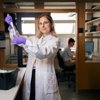Fritextsökning
Artiklar per år
Innehållstyper
-

Studie: Livslängd består trots betydande viktåtergång efter fetmakirurgi
Hos personer som genomgått fetmakirurgi och senare gått upp en del i vikt kvarstår vissa positiva hälsoeffekter. Deras risk för cancer och dödlighet förblir densamma som hos dem som lyckats behålla sin lägre vikt. Detta enligt en ny studie från Göteborgs universitet.
-

Cancer researcher: “We can do better and reduce suffering”
Lund University researcher Catharina Hagerling is developing innovative methods to understand metastatic cancer, aiming to create more targeted treatments for patients with disseminated cancer.
-

Isländskt bolag tar över delar av Xbrane – planerar ”stark närvaro” i svensk life science
Xbrane säljer sin FoU-verksamhet med 40 anställda, och ett av sina biosimilarprojekt, till isländska Alvotech. Prislappen landar på 275 miljoner kronor – och Xbranes aktie rusar efter beskedet.
-

Sobi inleder nytt samarbete inom sepsis
Särläkemedelsbolaget Sobi inleder ett nytt forskningssamarbete och en klinisk studie kring en potentiell behandling vid sepsis.
-

Tung patentutgång får Novartis att banta personalstyrkan
Novartis planerar att kapa bort 427 tjänster i USA, bland annat till följd av en kommande patentutgång för bolagets hjärtläkemedel Entresto.
-

Quretech granted a European patent for a new type of antibiotic
The European patent provides protection until 2041. Previously, the patent was granted in China, and the application is currently under review in the USA, India, and Japan.
-

Aqilion's licensing journey: From Merck partnership to new opportunities
Be extremely meticulous with your scientific data, but spend just as much time and effort on business development. That piece of advice comes from Aqilion's CEO Sarah Fredriksson and is directed at biotech companies aiming to find a good licensing partner.
-

Positive trend for Swedish medtech exports – “We have new markets that are huge”
In 2024, Swedish exports of pharmaceuticals decreased for the first time in several years. However, the trend for medical technology looks brighter. During a seminar, it was discussed how Swedish life science companies can navigate the changing global situation.
-

Career coach on salaries: “There is no right or wrong”
What is a reasonable salary for my job? It's a question we all ask ourselves. But how important is a higher salary really? Career coach Tina Persson believes this is an important consideration.
-

Stort tillslag mot vårdbolag efter misstänkta ekobrott
Två personer har begärts häktade vid Göteborgs tingsrätt efter att poliser genomfört ett omfattande tillslag mot pågående grova ekobrott kopplat till bland annat vaccinkliniker.
-

A tiny animal with great importance
From the mythical Ganges River to the less sacred, but considerably cleaner waters in KI's aquariums in Solna. The little zebrafish has made an unconscious career – as an increasingly important model organism in medical research.
-

A new scientific event in Gothenburg
Life Science Sweden is holding an event in Gothenburg for the first time.
-

Källor: CDC planerar studie av vacciner och autism
Samtidigt som USA har sitt största mässlingsutbrott på decennier planerar landets smittskyddsmyndighet en studie om koppling mellan autism och vaccin, enligt källor till Reuters.
-

Who pays for Rebecca Doe – and all of us?
Anna Törner on how easily we get used to the idea that healthcare is free - when it really is about how and who pays for it
-

The art of successful licensing – “A lot has to align”
Sharp research, strong data and a high level of innovation are all very good, but more than that is required to achieve the goal of many biotechnology companies: to succeed with a licensing deal.
-

Doge backar om nedläggning av viktigt FDA-labb
Trumpadministrationen drar efter kritik tillbaka beslutet att stänga ett av FDA:s viktigaste laboratorier för läkemedelskontroll.
-

BMS gör nedskärningar på hemmaplan
Läkemedelsjätten Bristol Myers Squibb kapar bort 280 tjänster vid sina anläggningar i New Jersey och Kalifornien.
-

Ytterligare läkemedelskandidat mot Alzheimers droppas
Ett litet schweiziskt biotechbolag avbryter en fas II-studien med sin läkemedelskandidat mot Alzheimers sjukdom. Beskedet kommer inte långt efter att Biogen och Eli Lilly gjort likadant med kandidater i samma klass.
-

Security flaw in Swedish breast cancer screening software – woman passed away
A lack of safeguard in Sectra's software led to a woman with breast cancer receiving an incorrect diagnosis. She later passed away. The software is used in 20 out of 21 regions in Sweden. It is also used in neighbouring Nordic countries. “Extremely
-

Säkerhetsbrist i svensk programvara för bröstcancerscreening – kvinna avled
En brist i Sectras programvara ledde till att en kvinna med bröstcancer fick ett felaktigt besked. Hon avled senare. Programmet används i 20 av 21 regioner i Sverige och nu vidtas åtgärder. ”Ytterst allvarligt”, säger Sectra-chefen till Medtech Magazine.
-

Behov av polypkirurgi nästan utplånat i studie
Problemen med polyper hos patienter med kronisk bihåleinflammation minskade kraftigt i en studie som utvärderade Tezspire från Astra Zeneca och Amgen.
-

Investment CEO: “The Nordics are outstanding in creating successful medtech companies”
Since the beginning of last month, Susanna Francke Rodau has been a partner and the new CEO of Segulah Medical Acceleration, which invests in medical technology. In an interview she tells about which companies the investment company prefers to invest
-

Health politician Lina Nordquist: ”I find it hard to be idle”
She is the pharmacist and researcher who grew tired of the breakthroughs that never materialised and knowledge that never seemed to reach patients, so she decided to make a change from within. Life Science Sweden meets Lina Nordquist, Member of Parliament for the Liberals and their spokesperson on healthcare policy, to have a conversation about reality, politics, and the need for writing.
-

Björn Arvidsson: ”We must raise our gaze to find the answers of the future”
A system approach isn't just about understanding complexity – it's about making better decisions. By seeing ourselves as part of larger systems, we can better anticipate the consequences of our actions, writes Björn Arvidsson in a column.